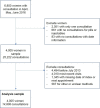Understanding 'missed appointments' for pills and injectables: a mixed methods study in Senegal
- PMID: 30687521
- PMCID: PMC6326323
- DOI: 10.1136/bmjgh-2018-000975
Understanding 'missed appointments' for pills and injectables: a mixed methods study in Senegal
Abstract
Introduction: High discontinuation rates of contraceptive methods have been documented in sub-Saharan Africa. However, little is known about gaps within individual episodes of method use, despite their implications for unintended pregnancies. The objective of this mixed methods study was to examine the prevalence of, and explore the factors contributing to, delays in repeat appointments for pills and injectables in Senegal.
Methods: First, we constructed a longitudinal data set of women's contraceptive consultations using routine records from 67 facilities in Senegal. Consultations for pills and injectables were classified as on time, delayed or with unknown delay status based on time since previous appointment. We described the prevalence of delayed appointments and used backward stepwise regression to build a mixed-effects model to investigate risk factors for delay. Second, we conducted workshops with family planning (FP) providers, and indepth interviews and focus group discussions with women of reproductive age, to explore factors contributing to delays.
Results: Almost one-third (30%) of appointments for pills and injectables were delayed, resulting in risk of pregnancy. Previous delay, pill use, lower educational level, higher parity, third and subsequent visits, and Islamic faith were independently predictive of delays (p<0.04 for all). Although women's 'forgetfulness' was initially mentioned as the main reason for delays by women and providers, examining the routines around appointment attendance revealed broader contextual barriers to timely refills-particularly widespread covert use, illiteracy, financial cost of FP services and limited availability of FP services.
Conclusion: Delays in obtaining repeat pills and injections are common among contraceptive users in Senegal, exposing women to unintended pregnancies. Strategies to reduce such delays should move beyond a narrow focus on individual women to consider contraceptive behaviour within the broader socioeconomic and health systems context. In particular, effective interventions addressing low acceptability of contraception and appointment reminder strategies in high illiteracy contexts are needed.
Keywords: Senegal; adherence; contraception; delay; discontinuation; family planning.
Conflict of interest statement
Competing interests: None declared.
Figures
References
-
- Pfizer , 2015. DEPO-PROVERA CI U.S. physician prescribing information. Available from: http://labeling.pfizer.com/ShowLabeling.aspx?id=522
-
- Electronic Medicines Compendium , 2017. SAYANA PRESS 104mg/0.65 ml suspension for injection. Available from: https://www.medicines.org.uk/emc/medicine/27798/SPC/SAYANA+PRESS+104+mg+...
Grants and funding
LinkOut - more resources
Full Text Sources

